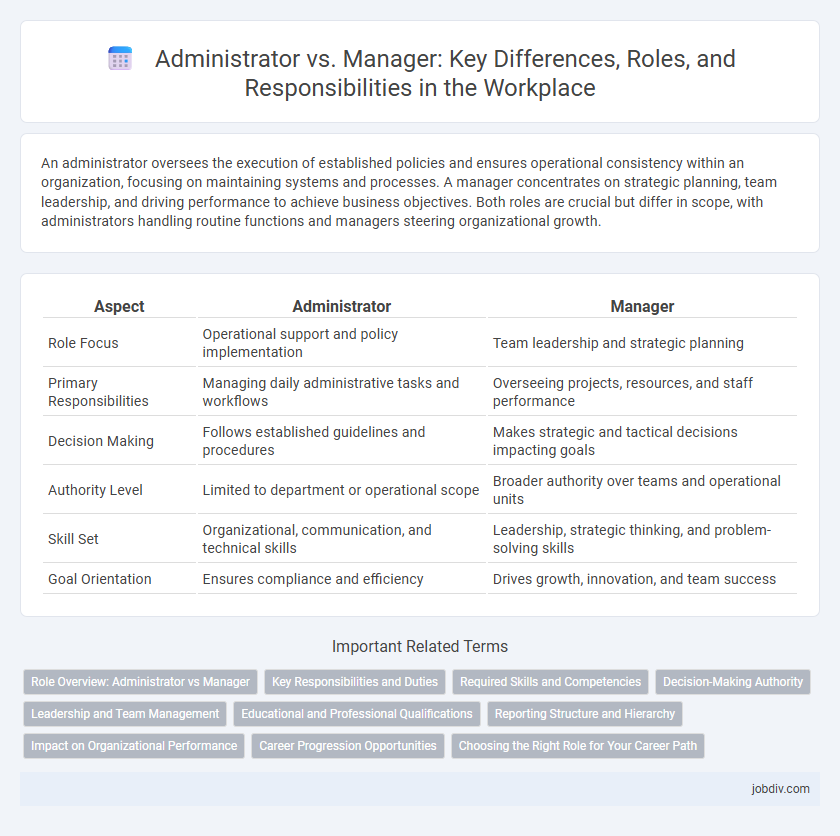An administrator oversees the execution of established policies and ensures operational consistency within an organization, focusing on maintaining systems and processes. A manager concentrates on strategic planning, team leadership, and driving performance to achieve business objectives. Both roles are crucial but differ in scope, with administrators handling routine functions and managers steering organizational growth.
Table of Comparison
| Aspect | Administrator | Manager |
|---|---|---|
| Role Focus | Operational support and policy implementation | Team leadership and strategic planning |
| Primary Responsibilities | Managing daily administrative tasks and workflows | Overseeing projects, resources, and staff performance |
| Decision Making | Follows established guidelines and procedures | Makes strategic and tactical decisions impacting goals |
| Authority Level | Limited to department or operational scope | Broader authority over teams and operational units |
| Skill Set | Organizational, communication, and technical skills | Leadership, strategic thinking, and problem-solving skills |
| Goal Orientation | Ensures compliance and efficiency | Drives growth, innovation, and team success |
Role Overview: Administrator vs Manager
Administrators oversee organizational operations by managing day-to-day tasks, maintaining systems, and ensuring compliance with policies to support smooth workflow. Managers focus on setting strategic goals, leading teams, and driving performance to achieve company objectives. Both roles require leadership skills, but administrators emphasize operational efficiency while managers prioritize decision-making and team direction.
Key Responsibilities and Duties
Administrators oversee daily operational tasks, ensuring compliance with organizational policies, managing records, and facilitating communication across departments. Managers focus on strategic planning, leading teams, setting performance goals, and making high-level decisions to drive business growth. Both roles require strong organizational and leadership skills but differ in scope and decision-making authority.
Required Skills and Competencies
Administrators require strong organizational skills, attention to detail, and proficiency in process management to ensure smooth daily operations and compliance with company policies. Managers need advanced leadership abilities, strategic thinking, and effective communication to lead teams, drive performance, and achieve organizational goals. Both roles demand problem-solving skills and adaptability, but managers emphasize interpersonal competencies and decision-making under pressure.
Decision-Making Authority
Administrators typically have a defined scope of decision-making authority centered on policy implementation, compliance, and operational oversight, ensuring organizational procedures are followed accurately. Managers possess broader decision-making power that includes strategic planning, resource allocation, team leadership, and performance management to drive business objectives. The distinction lies in managers making high-level decisions influencing company direction, while administrators focus on executing and maintaining those decisions within established frameworks.
Leadership and Team Management
Administrators ensure operational efficiency by maintaining structured processes and compliance, prioritizing task execution and resource allocation, which supports the team's functional stability. Managers focus on leadership qualities such as motivation, vision, and decision-making to inspire team performance and drive strategic objectives. Effective team management balances the administrator's organizational control with the manager's people-centric leadership to optimize productivity and achieve business goals.
Educational and Professional Qualifications
Administrators typically require a bachelor's degree in business administration, education, or a related field, with many holding advanced degrees such as a master's in educational leadership or public administration. Managers often possess similar educational backgrounds but emphasize practical certifications like PMP (Project Management Professional) or industry-specific credentials to demonstrate leadership expertise. Professional qualifications for administrators focus on strategic planning and organizational governance, while managers prioritize operational management and team leadership skills.
Reporting Structure and Hierarchy
Administrators typically operate within a defined reporting structure, overseeing day-to-day operations and ensuring compliance with organizational policies, often reporting to managers or higher-level executives. Managers hold a more strategic role in the hierarchy, responsible for setting goals, making decisions, and supervising administrators and other staff to achieve departmental objectives. The hierarchy places managers above administrators, emphasizing managers' accountability for broader performance and administrators' focus on operational execution.
Impact on Organizational Performance
Administrators enforce policies and maintain organizational structures, ensuring operational consistency and compliance that directly impact efficiency and risk management. Managers drive strategic initiatives, lead teams, and optimize resources to achieve performance targets and foster innovation. Effective collaboration between administrators and managers enhances overall organizational agility and productivity.
Career Progression Opportunities
Career progression opportunities for administrators typically involve advancing to managerial roles where strategic decision-making and team leadership become key responsibilities. Managers often experience broader scope in their career development, with potential paths leading to senior management, director positions, or executive roles such as Chief Operations Officer. Skill development in leadership, project management, and business strategy significantly enhances advancement prospects within these roles.
Choosing the Right Role for Your Career Path
Choosing between an administrator and a manager role depends on your career goals, skill set, and preferred responsibilities. Administrators focus on maintaining daily operations, ensuring compliance, and managing support functions, while managers drive team performance, strategic planning, and decision-making processes. Understanding the demands and growth opportunities in each position is crucial to aligning your career path with long-term professional success.
Administrator vs Manager Infographic

 jobdiv.com
jobdiv.com